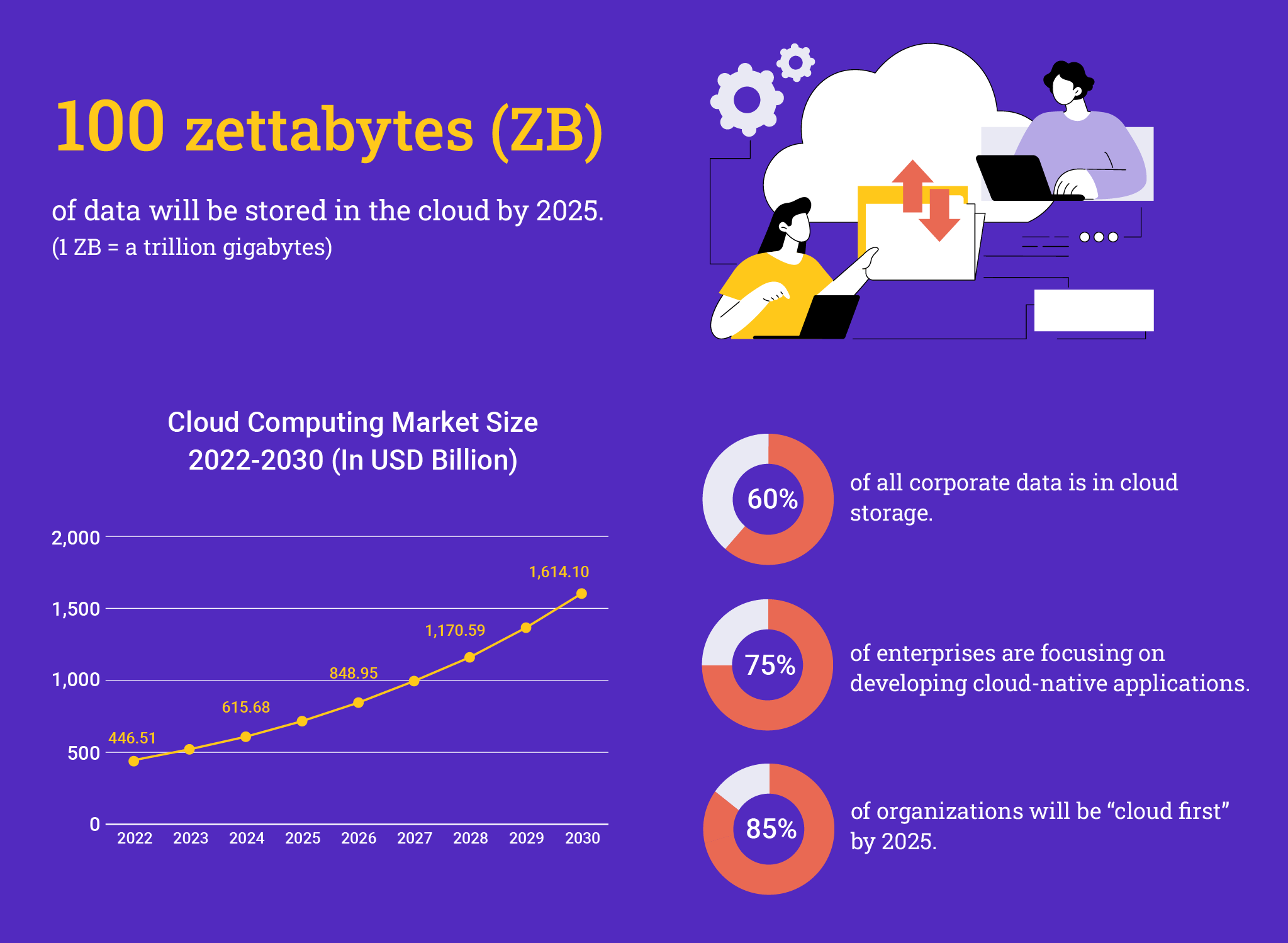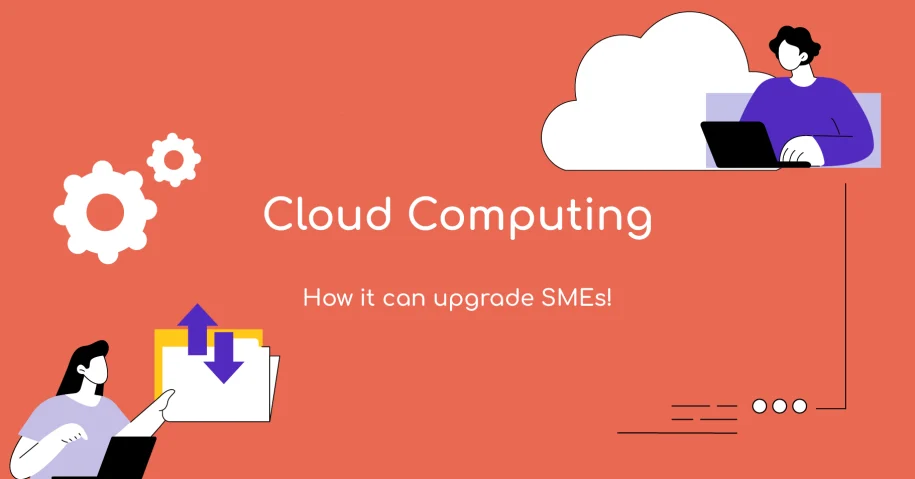What is Cloud Computing? The rapid pace of digital transformation and the needs for development that arose especially after the advent of the pandemic, gradually led businesses to applying a new type of computing resources.
Transferring data and services to the cloud has emerged as one of the most cost-effective and efficient business processes, as it offers businesses access to advanced tools. With data security, improved collaboration and cost savings, cloud computing technology is coming to unlock the potential of small and medium businesses and lead them into the new era!
In this article we will see:
- What is cloud computing technology?
- The main advantages of cloud computing technology
- Types of cloud computing
- Types of cloud computing services
- How can a business leverage cloud computing technology?
What is cloud computing technology?
Cloud computing is the on-demand provision of computing resources over the internet. This particular model includes the servers, storage, networking, software and analytics of a business.
Cloud computing services are usually offered through a form of subscription, and you only pay for the applications you use. Cloud Computing offers SMEs increased flexibility, efficiency and easy expansion possibilities in the management of their infrastructure, while significantly reducing their operating costs.
The main advantages of cloud computing technology
Cloud computing technology is a big change from the traditional way businesses manage their digital resources. The most common reasons why businesses choose cloud computing services are the following:
Cost saving
With cloud computing technology, SMEs can avoid upfront investments in hardware and software. The cost of installing and operating local servers and the expenses of an in-house IT support team are significantly reduced.
In addition, cloud services are offered in a pay-as-you-go format, allowing businesses to scale up or down depending on their needs.
Expansion possibilities
Cloud computing technology includes the ability to expand as your business needs change. This means changing the provisioning of IT resources, such as the right range of storage or power.
This flexibility allows businesses to react quickly to market demands and ensures that their digital capabilities align with their growth trajectory.
Productivity
Local servers usually require regular hardware maintenance and repair services, which puts a strain on the IT team. Cloud computing technology significantly reduces the need for many of these tasks, so your technical staff has time to spend on more important business goals.
Improved collaboration
Cloud computing facilitates seamless collaboration between your team members, regardless of their physical location. Team members can share files, collaborate on documents in real time, and communicate easily through cloud applications.
With this collaboration model you can significantly boost productivity by streamlining workflows and ensuring a smooth and seamless collaboration between your employees.
Data Security
Cloud service providers prioritize data security to protect their customers’ vital information. SMEs benefit from industry-leading security measures, advanced encryption, firewalls and regular backups, ensuring their data is safe and accessible at all times.
With data stored in the cloud, businesses can also recover critical information quickly in the event of system failures or disasters.
Access to innovation
Cloud computing offers small and medium-sized businesses access to cutting-edge technologies that have traditionally been out of reach. With cloud-based platforms, businesses can leverage AI, machine learning, and Big Data Analytics to gain valuable insights, make data-driven decisions, and achieve a competitive edge in the marketplace.

Types of Cloud Computing
Did you know there are different types of cloud? The cloud comes in different types, models and services that serve different needs.
Below we will look in detail at the three different types of cloud computing service deployment.
Public cloud
Public clouds are owned and operated by third-party cloud service providers, who provide resources such as servers and storage over the Internet. Microsoft Azure is an example of a public cloud.
With a public cloud, all hardware and support equipment are owned and managed by the cloud provider, while you access these services and manage your account through a web browser.
Private cloud
Private cloud computing refers to cloud resources used exclusively by a single business or organization. The private cloud resides in the organization’s datacenter – some companies house their private network in a third-party service provider’s cloud. An example of a private cloud is OpenStack.
Hybrid cloud
Hybrid cloud combines public and private clouds, allowing data and applications to be shared between them. By moving data and applications between private and public networks, a hybrid cloud gives your business more flexibility and more options for deployment. Examples of hybrid cloud are AWS Outsports and Azure Hybrid Cloud.
Types of cloud computing services
Most cloud computing services fall into the following categories: infrastructure as a service (IaaS), platform as a service (PaaS), software as a service (SaaS), and serverless.
IaaS (Infrastructure as a Service)
The most basic category of cloud computing services is Infrastructure as a Service. With this model, you rent IT infrastructure, such as servers and virtual machines, storage space, networks and operating systems, from a cloud provider for a monthly or annual subscription.
PaaS (Platform as a Service)
Platform as a Service (PaaS) refers to cloud computing services that provide an on-demand environment for developing, testing, delivering and managing software applications. PaaS makes it easy for developers to quickly and easily design applications without worrying about managing an on-premise infrastructure.
SaaS (Software as a Service)
Software as a Service refers to the delivery of software applications over the Internet, on demand and by subscription. With SaaS, cloud providers host and manage the software application and infrastructure, while also handling any maintenance, such as software upgrades and security patches.
Serverless computing
In conjunction with PaaS, serverless computing refers to a service delivery model where the cloud provider manages the server and infrastructure. A serverless architecture enables easy expansion as needs change.
How can a business leverage cloud computing technology?
1. Automation of processes
Every modern enterprise has business management applications such as ERP (Enterprise Resource Planning) and CRM (Customer Relationship Management). The integration of such applications into the management of a business is one of the most typical examples of how cloud computing technology can significantly upgrade the operation of an organization.
By easily managing a business’s core resources, you ensure cost savings, greater efficiency and an improved experience for your customers.
2. File storage
The cloud offers a modern solution to data storage over the traditional hard drive. The main advantage of cloud storage is easy access to files from any device and from anywhere – all you need is an internet connection.
With cloud computing-based storage services such as OneDrive or Dropbox, you can ensure secure access and flexibility as you have the ability to increase or decrease your storage space based on your business needs.
3. Big Data Analytics
A business that wants to gain a competitive advantage in today’s market must be able to collect data about its customers, market trends and sales performance, also known as big data.
Gathering big data is beneficial for a small and medium-sized business for many reasons, most notably: discovering business growth opportunities and making key business decisions. With cloud computing technology, big data analysis is automated and becomes faster and more accurate than ever
4. Backup
In today’s age, cybercrime is a major threat to businesses. Traditional data backup methods are vulnerable to external attacks, but cloud-based backup and archiving provides maximum data security.
Cloud computing technology allows you to back up or archive sensitive data on storage systems, ensuring protection from online threats. Cloud services also offer options to encrypt your backups for maximum protection.
5. Software development
In-house software development can be an extremely expensive and slow process. It requires the installation of sophisticated hardware and software, but also the continuous training of the staff. This can put a business at a competitive disadvantage.
Cloud service providers offer tools for faster and simpler software design and testing. Platforms like Microsoft Power Apps make it possible to develop business applications without requiring specialized knowledge of code, saving businesses time and money.
6. Improved communication
Cloud computing technology enables employees to ensure communication internally and externally through tools such as email and calendar. Additionally, messaging and calling apps like Skype and WhatsApp are also in the cloud.
Improved communication is the be-all and end-all of remote collaboration. Through online meetings you have the possibility to communicate from anywhere with your coworkers and customers and create a modern flexible working environment!
7. Social networking
Social media is probably the most widespread cloud computing application. Platforms like Facebook, Instagram, and LinkedIn are cloud-based and make it easy to connect with people who have similar interests to you.
In the case of a business, social media can be a powerful marketing tool as they help project the business outwards, connect and communicate with its audience, and even find partners.
Take your business into the digital age with the help of experts
Does moving your infrastructure to the cloud seem to be a huge deal for your business? NUS Solutions is here for you!
With the help of our team of experts and the partnership with Microsoft, you can ensure a holistic digital experience for your business and significantly upgrade its operation. Adopt modern platforms and sophisticated tools to save cost and effort from time-consuming processes and discover the endless possibilities of digital transformation.





…